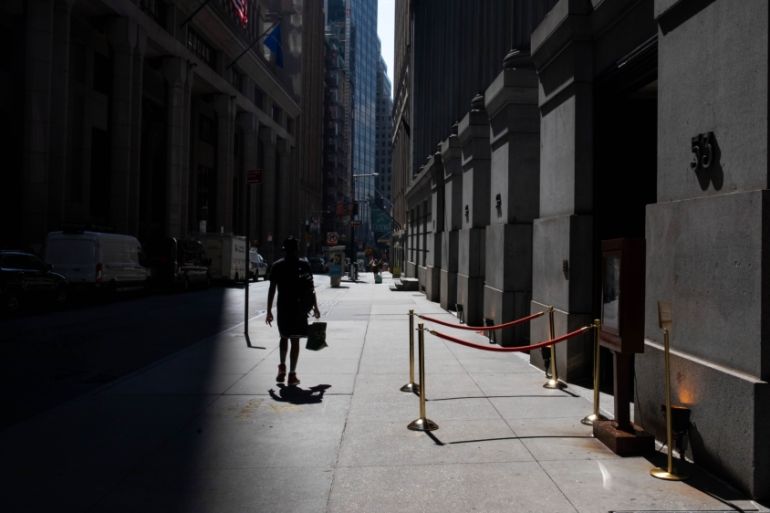S&P 500 closes shy of record as US election kicks into high gear
Since bottoming out in March, the S&P has come roaring back to within striking distance of its pre-pandemic peak.

The S&P 500 index on Monday once again closed just shy of its all-time record, while the Dow Jones Industrial Average finished in the red, as investors positioned their portfolios for the United States presidential election that kicks into high gear this week.
The S&P 500 – a gauge for the health of US retirement and college savings accounts – finished up 0.27 percent at 3,381.99. That put the benchmark index within a hair’s breadth of its all-time closing record of 3,386 reached on February 19 – before COVID-19 lockdowns plunged the US economy into its deepest recession since the Great Depression of the 1920s.
Keep reading
list of 4 items‘Insurrection’ should bar Donald Trump from US presidency, lawyers argue
Ex-Proud Boys leader Joseph Biggs sentenced to 17 years for US Capitol riot
Trump indictments: Key court dates set in Georgia, federal election cases
Since bottoming out in March, the S&P has come roaring back to within striking distance of its pre-pandemic peak, driven by trillions of dollars in stimulus from the US Federal Reserve and Congress to help businesses, workers and consumers cope with the unprecedented financial fallout of the pandemic.
Much of the S&P 500’s impressive rebound is courtesy of a red hot rally in technology shares that have benefitted from remote work and shifting consumer habits in the wake of the pandemic.
Shares compromising the S&P 500 are weighted by their market capitalisation or the total value of a company’s outstanding shares.
Apple, Microsoft, Amazon, Google parent Alphabet and Facebook accounted for 14 percentage points of the index’s more than 50 percent rally since March, analysts at Goldman Sachs said in a note to clients on Sunday. Those tech behemoths now constitute a massive 23 percent of the index’s capitalisation.
“Stated differently, the other 495 stocks collectively contributed just 72 percent of the rebound,” said Goldman.
The enduring love affair investors are having this year with tech stocks helped drive the Nasdaq Composite Index to another record close on Monday of 11,129.73.
Breaking with the winning streak on Wall Street, the Dow – which weights stocks by their price and not their overall market value – finished the session down 0.31 percent at 27,844.91.
The US elections are entering a turbo-charged phase with the Democratic and Republican presidential nominating conventions on tap for this week and next week, respectively.
Goldman Sachs analysts on Sunday raised their S&P 500 year-end price target to 3,600 from 3,000, but noted that uncertainty surrounding the election “represents a significant risk to our year-end forecast”.
“The coronavirus introduces a major complication in the timely tabulation of voting results,” Goldman noted. “Consider the New York 12th Congressional District Democratic primary, where it took six weeks to count all the absentee ballots and determine a winner. And this was just a primary election.”
Investors are waiting for a read on the pulse of US consumers with major retailers including Walmart, Target and Home Depot reporting earnings this week.
One huge uncertainty hanging over consumers – and the broader US economy which is largely powered by consumer spending – are stalled negotiations between Democrats and Republicans in Congress over a new round of virus relief aid.
Banking and financial shares came under pressure on Monday after Warren Buffet’s Berkshire Hathaway revealed in regulatory filings on Friday that it has significantly pared back its holdings in major US banks including Wells Fargo and JPMorgan Chase and dissolved its stake in Goldman Sachs Group.
Shares of Wells Fargo and JPMorgan Chase closed down 3.28 percent and 2.63 percent respectively, while Goldman Sachs shares finished down 2.35 percent.
